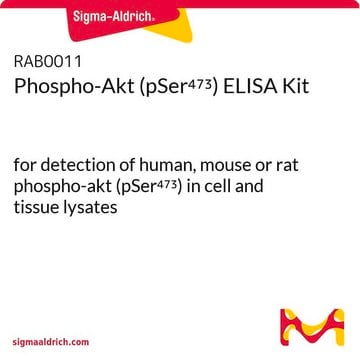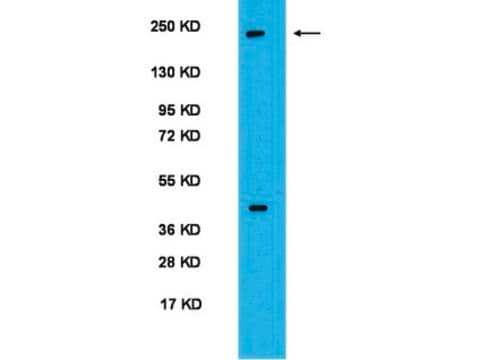AB1665
Anti-Fas Ligand Antibody
serum, Chemicon®
Synonim(y):
FasL
Zaloguj sięWyświetlanie cen organizacyjnych i kontraktowych
About This Item
Kod UNSPSC:
12352203
eCl@ss:
32160702
NACRES:
NA.41
Polecane produkty
pochodzenie biologiczne
rabbit
forma przeciwciała
serum
rodzaj przeciwciała
primary antibodies
klon
polyclonal
reaktywność gatunkowa
mouse, rat
spodziewany brak reakcji z
human
producent / nazwa handlowa
Chemicon®
metody
ELISA: suitable
western blot: suitable
numer dostępu NCBI
numer dostępu UniProt
Warunki transportu
dry ice
docelowa modyfikacja potranslacyjna
unmodified
informacje o genach
human ... FAS(355)
Immunogen
An 18 amino acid peptide sequence (aa 130-146) from rat FASL. This sequence is known to be 94% homologous with mouse FASL, differing by one amino acid. This peptide region does not show significant homology with human FASL, with only four amin
Zastosowanie
Detect Fas Ligand using this Anti-Fas Ligand Antibody validated for use in ELISA & WB.
Research Category
Apoptosis & Cancer
Apoptosis & Cancer
Research Sub Category
Apoptosis - Additional
Apoptosis - Additional
Western blotting:1:1000 - 1:5,000, using Chemiluminescent detection. The use of 0.1 - 0.5% milk in diluents is recommended to reduce background. Based upon the calculated amino acid sequences, rat (278), mouse (279), and human (281) FASL has a molecular weight of ~32 kDa. A 40 kDa FASL band has been detected in mouse T cells.
ELISA: 1:10,000 - 1:50,000, for detection of control peptide (AG626) coated at a 1 μg/mL concentration.
Optimal working dilutions must be determined by end user.
ELISA: 1:10,000 - 1:50,000, for detection of control peptide (AG626) coated at a 1 μg/mL concentration.
Optimal working dilutions must be determined by end user.
Postać fizyczna
Liquid antiserum containing 0.05% sodium azide as a preservative.
Przechowywanie i stabilność
Store at -20°C for up to 12 months in undiluted aliquots. Avoid repeated freeze-thaw cycles.
Informacje prawne
CHEMICON is a registered trademark of Merck KGaA, Darmstadt, Germany
Oświadczenie o zrzeczeniu się odpowiedzialności
Unless otherwise stated in our catalog or other company documentation accompanying the product(s), our products are intended for research use only and are not to be used for any other purpose, which includes but is not limited to, unauthorized commercial uses, in vitro diagnostic uses, ex vivo or in vivo therapeutic uses or any type of consumption or application to humans or animals.
This page may contain text that has been machine translated.
Not finding the right product?
Try our Narzędzie selektora produktów.
Kod klasy składowania
10 - Combustible liquids
Klasa zagrożenia wodnego (WGK)
WGK 1
Certyfikaty analizy (CoA)
Poszukaj Certyfikaty analizy (CoA), wpisując numer partii/serii produktów. Numery serii i partii można znaleźć na etykiecie produktu po słowach „seria” lub „partia”.
Masz już ten produkt?
Dokumenty związane z niedawno zakupionymi produktami zostały zamieszczone w Bibliotece dokumentów.
Gabriella Brunlid et al.
Stem cells (Dayton, Ohio), 25(10), 2551-2558 (2007-07-07)
The potential of pluripotent embryonic stem (ES) cells to develop into functional cells or tissue provides an opportunity in the development of new therapies for many diseases including neurodegenerative disorders. The survival of implanted cells usually requires systemic immunosuppression, however
Nasz zespół naukowców ma doświadczenie we wszystkich obszarach badań, w tym w naukach przyrodniczych, materiałoznawstwie, syntezie chemicznej, chromatografii, analityce i wielu innych dziedzinach.
Skontaktuj się z zespołem ds. pomocy technicznej





